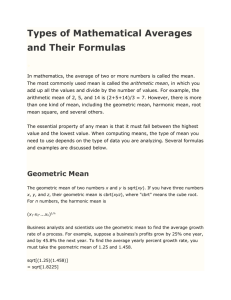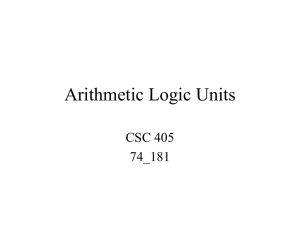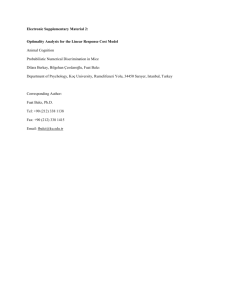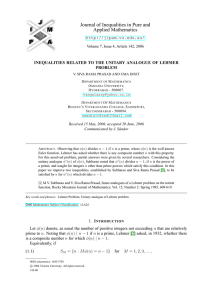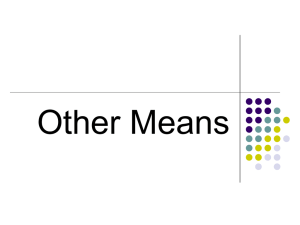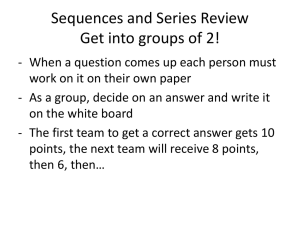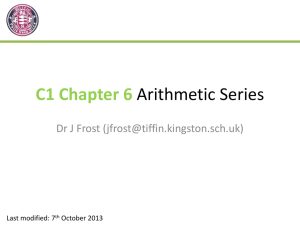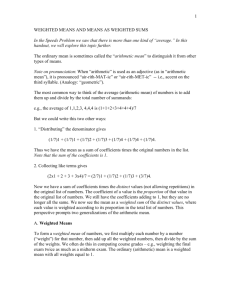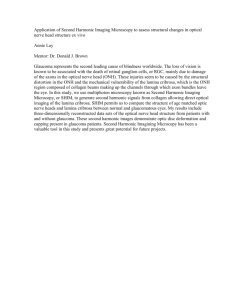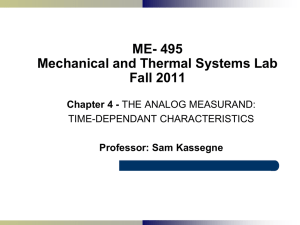Arithmetic-Geometric Mean
advertisement
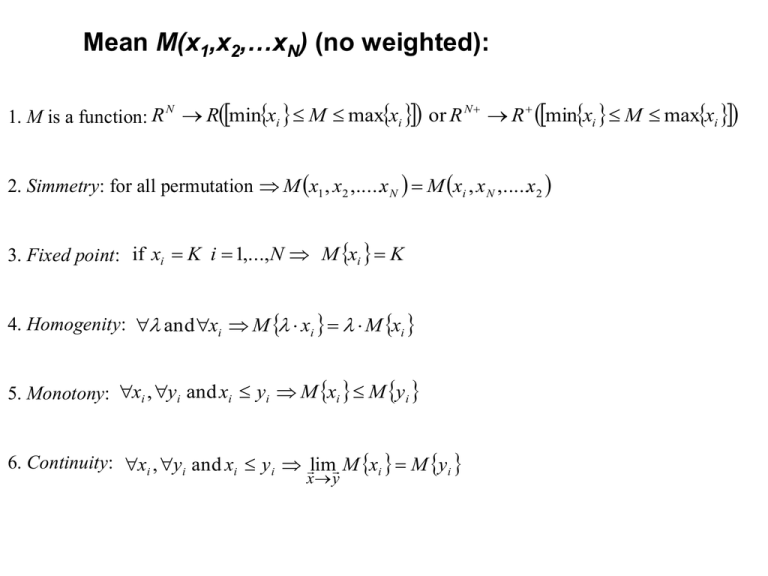
Mean M(x1,x2,…xN) (no weighted): N N 1. M is a function: R Rminxi M maxxi or R R minxi M maxxi 2. Simmetry: for all permutation M x1 , x2 ,.....x N M xi , x N ,.....x2 3. Fixed point: if xi K i 1,...,N M xi K 4. Homogenity: and xi M xi M xi 5. Monotony: xi , yi and xi yi M xi M yi 6. Continuity: xi , yi and xi yi lim M xi M yi x y So for the point 2, to make a mean, we have to use some operation with commutative property; the simplest are: N N x i 1 x i i i 1 Moreover for the fixed point property (3), if all number are iguals the mean is the same value, so we have to add something: 1 N N x i 1 N i Arithmetic Mean N x i i 1 Geometric Mean First method to build anothers means: x1 N 1 f 1 f ( xi ) N i 1 f (..) Traditional Block xi xN ………… f (..) ………… 1 N N i 1 N N f 1 (..) i 1 f (..) For example, if we choose f(x)=1/x and arithmetic mean as traditional block, we discover the Harmonic Mean: N Harmonic Mean N 1 i 1 x i Media if we choose f(x)=xs and arithmetic mean as traditional block, we find the Power Mean: Power Mean 1 N x i 1 N s i 1 s Second method to build anothers means: for two numbers, but is possible to generalize f ' ( x) y f ( x) f ( y ) f ' x y 1 x x f ( x) f ( y ) f ' ( x)dx y f ( x) f ( y ) f ( x) f ( y ) f ' ( ) ( x y ) f ' ( ) ( x y) f ( x) f ( y ) ( f ' ) ( x y) 1 Third form, to build anothers means: N p 1 x i Lehmer mean i 1 N p x i i 1 First group f ( x) f ( y ) f 1 2 Harmonic Mean f ( x) 2 1 1 x y 1 x f ( x) ln(x) xy f ( x) x p Power Mean x y 2 p p 1 p p p p 1 max(x, y) p2 x y 2 2 x y 2 p0 1 p 2 min(x, y) Power Mean of orden 2 (Root Mean Squares) Quadratic Mean Second group f ( x) f ( y ) ( f ' ) x y 1 f ( x) x ln(x) f ( x) x p Identric Mean 1 x y x x e yy Power mean orden 1/2 Logarithmic Mean Stolarsky Mean p 1 p x y 2 f ( x) ln(x) 1 2 2 xp yp p ( x y) p 1 1 p 1 p0 p min(x, y) p2 xy p max(x, y) x y 2 x y ln(x) ln(y ) p3 Strange connection geometric-quadratic x 2 y 2 xy 3 Looks Heronian x p 1 y p 1 xp yp Third group p p 1 max(x, y) x y x y 2 p p 1 2 2 min(x, y) 1 1 x y p0 Contraharmonic Mean 1 p 2 x y 2 p 1 2 xy x y xy Clic there is a demostration All means with negative p have the the coniugate mean respect the arithmentic mean, with positive p. Equivalent Form of Lehmer Mean q=-p yq x xq y yq q q q q x y x y q q q 1 min(x, y) 2 xq x q q x y xy 1 1 x y 1 2 q0 x y 2 y q max(x, y) We can write the Lehmer Mean in this form too: x p 1 y p 1 x p x y p y x p p p p p p p x y x y x y Like weighted mean…. yp x p p x y y Another type Heronian Mean Heinz Mean x y xy 3 x p y 1 p x1 p y p 2 1 2 p 1 0 Logarithmic Mean i / 1i / x y i 0 1 Average of Means like Heronian and Heinz. 1 x 0 p y 1 p x y dp ln(x) ln(y ) Mixed Means Arithmetic-Geometric Mean Arithmetic-Harmonic Mean Geometric-Harmonic Mean an g n x y a1 a n 1 2 2 g xy g a g n n 1 n 1 These two sequences converge to the same number. For the Arithmetic-Geometric Mean there is a closed for expression: x y AGM 4 x y K x y Where K(x) is the complete elliptic integral of first kind. Demostration of an expression: ( x y ) x3 y3 x 2 y 2 yx 3 xy 3 ( x y ) ( x y ) yx x y x y x y x y ( x y ) ( x y xy ) x y xy x y An observation: ( x y ) x y y x ( xy xy x xy y xy) xy x y x y Another observation: xp 2p p p 0 p p p y x 2 3 3p p p 1 p 2 3 Moreover: 1. Elementary Symmetric Mean And…. 1. Median 2. Mode
